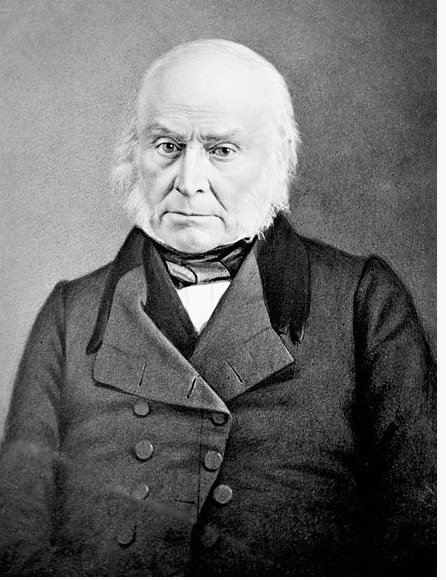
John Quincy Adams was born on July 11, 1767 in Braintree, Massachusetts to John and Abigail Adams. His father, who would later become the second President of the United States, was often away on business, so John Quincy was mainly raised by his mother and instructed by private tutors. Signs of precocity and exceptional literary skills were evident by the time he reached 10 years of age and by age 11, John Quincy traveled with his father to Europe and enrolled at Leiden University where he studied French, Greek, Latin and law.
In 1785, at the age of 18, John Quincy Adams entered Harvard and graduated two years later, standing second in his senior class. He subsequently earned his law degree and by 1790 hung out his shingle in Boston. In the years that followed, he became more involved in politics and was appointed U.S. ambassador to Portugal in 1796 and ambassador to Prussia in the following year.
In February 1803, John Quincy Adams, now a member of the Federalist Party, was elected to the United States Senate and during that term supported the Louisiana Purchase and expansionist policies. Simultaneously, he served as a professor of logic at Brown University and as the Boylston Professor of Rhetoric and Oratory at Harvard University. In 1809, Adams served as first United States Minister to Russia. Six years later, President Madison appointed him Secretary of State–a position he held through President Monroe’s two terms spanning 1817 through 1825.
Even though John Quincy lacked the personal charisma that excites an electorate, his many significant contributions, including his role in the development of the Monroe Doctrine, earned him a reputation as a highly competent statesman and on March 4, 1825 he was inaugurated as the 6th President of the United States. In this role, he provided leadership and financing for the creation of a national university, a naval academy, a national astronomical observatory and later the Smithsonian Institute. On the domestic front, he opposed slavery and presented anti-slavery petitions. Applying his extensive knowledge of international affairs, he became a strong advocate for the adoption of the metric system to facilitate trade, and was able to promote legislation that ultimately boosted the US economy.
In 2006, psychologist Dean Keith Simonton conducted what is called a historiometric study of the 42 US presidents from George Washington to George W. Bush in an attempt to estimate their IQs. Entering data from biographies detailing their educational backgrounds, personality descriptions, intellectual achievements, and accomplishments into a sophisticated software program designed to estimate IQs from such profiles, he produced an IQ ranking. John Quincy Adams came out on top with an estimated IQ of 175, followed by Thomas Jefferson at 160.0 and John Kennedy at 159.8. Acknowledging that IQ is only one factor in measuring the effectiveness of a president, Simonton states, “Intellect is not, by any means, the only predictor of presidential leadership. Many other variables are involved as well, including both personality traits and situational factors.” For the listing of US Presidents by estimated IQ see: https://www.intelligence-and-iq.com/who-was-the-most-intelligent-president-in-us-history/
